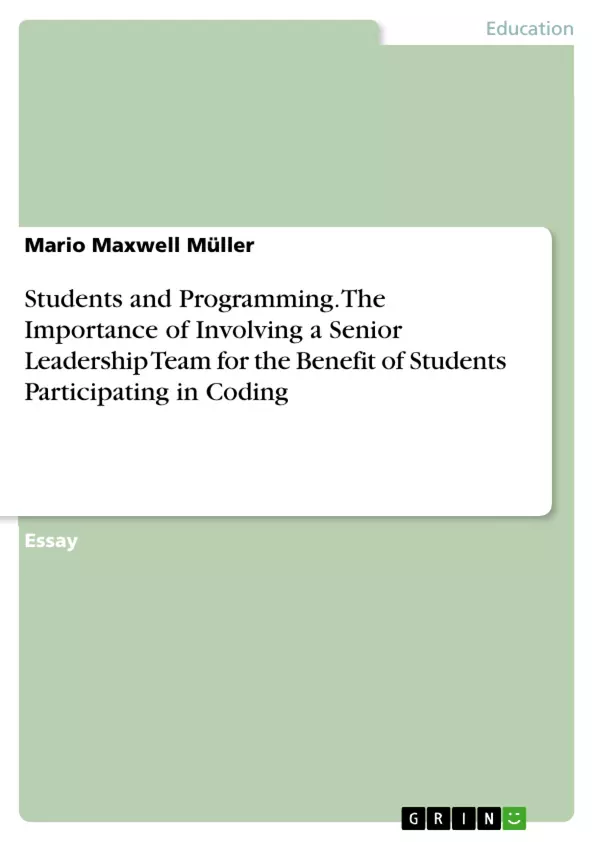The following essay will highlight the importance of introducing coding within the international schools, with one objective to get students enthusiastic about learning and discovering new technologies, exploring new software, and creating their own programmes to benefit their educational learning in your school. Making provision for mathematics, science, technology and engineering, whilst attending to their intellectual stimulation through high levels of engagement, participation and a range of fun-filled activities where students are engaged, and share ideas, opinions, and skills to motivate others within a diverse setting.
Inhaltsverzeichnis (Table of Contents)
- Abstract
- Introduction
- How to Convince the Head of School, Administrators, and Parents of the Importance of Coding
- Through Inquiry-Based Activities, Students Think About Reflections and How They Can Improve
- The Benefits Teachers Will Gain Through Motivating Students to Explore Technology Will Encompass the Improvement of Critical Thinking
Zielsetzung und Themenschwerpunkte (Objectives and Key Themes)
This essay aims to highlight the importance of introducing coding into international schools, emphasizing its potential to foster student enthusiasm for learning and technological exploration. The essay also emphasizes the role of inquiry-based learning in promoting STEM education within the International Baccalaureate Programme.
- The importance of introducing coding in international schools
- The role of inquiry-based learning in coding education
- The benefits of coding for students' academic success
- The integration of coding into the International Baccalaureate Programme
- The importance of engaging senior leadership in supporting coding initiatives
Zusammenfassung der Kapitel (Chapter Summaries)
- Abstract: This section briefly introduces the essay's focus on the importance of introducing coding in international schools and its objective to engage students in learning and technological exploration.
- Introduction: This chapter lays out the essay's central argument: that coding should be integrated into international schools to promote STEM education and prepare students for the 21st century. The author emphasizes the need for educators to take initiative and implement coding within schools to enhance learning outcomes.
- How to Convince the Head of School, Administrators, and Parents of the Importance of Coding: This section delves into the significance of coding in the context of technology and Information Technology (IT) within schools. The author emphasizes the role of coding in promoting STEM education and its connection to transdisciplinary learning.
- Through Inquiry-Based Activities, Students Think About Reflections and How They Can Improve: This section explores the benefits of inquiry-based learning in coding education, highlighting how it encourages student curiosity, active participation, and reflection on their learning experiences.
Schlüsselwörter (Keywords)
The main keywords and focus topics of this text revolve around the importance of introducing coding in international schools to promote STEM education. Key concepts include inquiry-based learning, the International Baccalaureate Programme, technology integration, and the benefits of coding for student development. The essay underscores the need for collaborative efforts among educators, administrators, and parents to effectively implement coding initiatives within educational settings.
- Quote paper
-
Mario Maxwell Müller (Author)
 , 2022, Students and Programming. The Importance of Involving a Senior Leadership Team for the Benefit of Students Participating in Coding, Munich, GRIN Verlag, https://www.hausarbeiten.de/document/1290538
, 2022, Students and Programming. The Importance of Involving a Senior Leadership Team for the Benefit of Students Participating in Coding, Munich, GRIN Verlag, https://www.hausarbeiten.de/document/1290538


